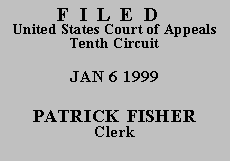

| MARATHON OIL COMPANY, an Ohio
company,
v.
BRUCE BABBITT, Secretary of the
United States Department of the Interior COLORADO ENVIRONMENTAL COALITION, a non-profit Colorado corporation; WILDERNESS SOCIETY, a non-profit District of Columbia corporation, Defendants-Intervenors- Appellees. |
No. 97-1254 (D.C. No. 97-AP-266) |
The district court correctly relied on Ash Creek Mining Co. v. Lujan, 969 F.2d 868 (10th Cir. 1992); Wyoming ex rel. Sullivan v. Lujan, 969 F.2d 877 (10th Cir. 1992); Mount Evans Co. v. Madigan, 14 F.3d 1444 (10th Cir. 1994); and Baca v. King, 92 F.3d 1031 (10th Cir. 1996), each holding plaintiffs lacked standing because their injuries were not redressable by a favorable decision. The district court found Marathon's position indistinguishable from that of Baca, Ash Creek Mining, and Wyoming and dismissed the action, notwithstanding Marathon's insistence Lujan v. Defenders of Wildlife, 504 U.S. 555 (1992), would permit jurisdiction in its case.
On appeal, Marathon argues the district court did not give proper consideration to the facts pled in its complaint or contained in the administrative record, all of which must be construed in plaintiff's favor. Marathon insists "the facts pled by Marathon establish that Marathon's injury will 'likely' be redressed by a declaration of the challenged policy's illegality."
The crux of Marathon's argument is the district court applied the wrong redressability test, albeit derived from our cases, but ignorant of Justice Scalia's plurality opinion in Defenders of Wildlife, as fully refined and articulated in the unanimous holding of Bennett v. Spear, 520 U.S. 154, 117 S. Ct. 1154 (1997). Marathon urges Defenders and Bennett have articulated a less stringent redressability test which does not require as direct an injury to establish standing as our prior cases have dictated. We disagree.
Both Defenders and Bennett are Endangered Species Act (ESA) cases in which the Court sought to delimit the standing provision within that statutory scheme. In Defenders, noting standing requirements are "not mere pleading requirements but rather an indispensable part of the plaintiff's case," 112 S. Ct. at 2136, each element requiring support in the same way as plaintiff would bear any other burden of proof, the Court also observed the burden is different when plaintiff is himself the object of the injury and when "plaintiff's asserted injury arises from the government's allegedly unlawful regulation (or lack of regulation) of someone else, much more is needed." Id. at 2137. The court concluded plaintiffs could not establish injury because even if the district court had issued the orders requested, they would not have bound other agencies involved in the alleged illegal action. In that case, only the various funding agencies could ultimately implement the order, and none was a party to the action or provided enough funding in any case. We agree with the district court's conclusion this case is inapposite.
Bennett, again addressing the particular facts presented under the ESA's standing provision, held that injuries alleged by two Oregon irrigation districts and operators of two ranches within the districts were within the ESA's zone of interest permitting citizen suits. The harm alleged in Bennett was economic, deriving from a challenge to the Secretary's restricting water flows essential to their operations but harmful to the Lost River Sucker and Shortnose Sucker. The Court read broadly the "any person" threshold for standing under the ESA, permitting those challenging and those protecting an environmental action to be viewed within the same zone of interest. Given plaintiffs' allegations, the Court found the injury alleged was fairly traceable to the agency's action. Because of the absence of economic harm in this case, however, we believe Bennett is not germane.
The jurisprudence of standing "is a highly case-specific endeavor, turning on the precise allegations of the parties seeking relief." Wyoming, 969 F.2d at 882. We are satisfied, however, this case falls in step with its Tenth Circuit precursors. See also State
of Utah v. Babbitt, 137 F.3d 1193 (10th Cir. 1998).
AFFIRMED.
ENTERED FOR THE COURT
John C. Porfilio
Circuit Judge
*. This order and judgment is not binding precedent, except under the doctrines of law of the case, res judicata, and collateral estoppel. This court generally disfavors the citation of orders and judgments; nevertheless, an order and judgment may be cited under the terms and conditions of 10th Cir. R. 36.3.